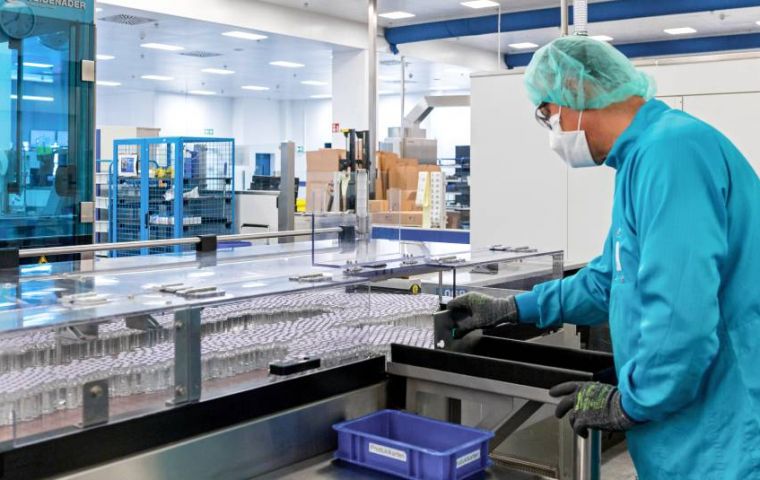MercoPress. South Atlantic News Agency
Argentina and Brazil to expand development of mRNA COVID-19 vaccines
 The world is shifting towards mRNA vaccines also in South America
The world is shifting towards mRNA vaccines also in South America While the World Health Organization (WHO) has suspended the approval process of the Russian-developed Sputnik V COVID-19 vaccine, the Pan American Health Organization (PAHO) has chosen Argentina and Brazil to further manufacture mRNA immunizers.
The WHO has reportedly detected failures regarding “cross-contamination” during a visit to the Russian plant in Ufa, which led to the suspension of the progress of approval pending further inspection.
At a press conference for the Pan American Health Organization, a regional branch of the WHO, Deputy Director Jarbas Barbosa said several manufacturing violations for the Sputnik V vaccine were discovered during a WHO inspection in Russia in May. The WHO previously reported that it had found multiple violations and had concerns related to the “implementation of adequate measures to mitigate the risks of cross-contamination” at a Pharmstandard factory in the Russian city of Ufa.
But the manufacturing facility has said it had already solved those issues and that inspectors had not contested the vaccine's safety or efficacy. Independent experts quoted by The Moscow Times have warned flaws could compromise the quality of the product, while the WHO has suggested further inspections of the facilities would be required.
Russia has applied for approval from both the WHO and the European Medicines Agency (EMA) in February, following the publication of research in the leading medical journal The Lancet that showed the vaccine to be 91.6% effective.
This step is key not only to increase the legitimacy of the Russian vaccine - the first against the coronavirus to be announced worldwide last year - but also for those who received it and who are still unable to travel to Europe and other destinations which require WHO or EMA validated drugs to arriving travellers.
EMA's head of vaccine strategy, Marco Cavaleri, said the timeline for final approval was “uncertain.”
Meanwhile, the PAHO has chosen Argentina and Brazil to create two development centres to increase the production of vaccines with messenger RNA (mRNA) technology and thus reduce the gaps in access to inoculants against the coronavirus in the region, it was announced by Barbosa together with WHO Chief Scientist Soumya Swaminathan.
The private company Sinergium Biotech was selected as the centre in Argentina to develop and manufacture the active ingredients for the vaccine in partnership with mAbxience which produces the AstraZeneca vaccine in Argentina and belongs to the same holding.
The announcement was made Wednesday during a PAHO virtual meeting on technology transfer for mRNA vaccine production in the Americas, attended by Argentine Health Minister Carla Vizzotti and PAHO Director Carissa Etienne.
Vizzotti highlighted this type of initiative that put into play the articulation between the public and private sectors, together with international organizations. “Our region has the essential capacities necessary to expand regional production and reduce gaps in access to vaccines, as well as other strategic supplies that our countries suffer,” she said.
According to PAHO data, the region was the most affected by Covid-19 globally to date, with 87.6 million registered cases and more than 2.16 million deaths. Vaccine distribution continues to be uneven and few countries in the region reached the vaccination target of 40% of the population set by WHO.
Meanwhile, in Brazil, this development has been entrusted to the Bio-Manguinhos Institute of Technology in Immunology, which is part of the Oswaldo Cruz Foundation (FIOCRUZ).
Coronavirus mRNA vaccines, such as Pfizer and Moderna, instruct cells to produce a harmless portion of what is known as “Spike protein” that is present on the surface of the virus that causes Covid-19.
Sputnik V is not an mRNA drug.




Top Comments
Disclaimer & comment rulesCommenting for this story is now closed.
If you have a Facebook account, become a fan and comment on our Facebook Page!